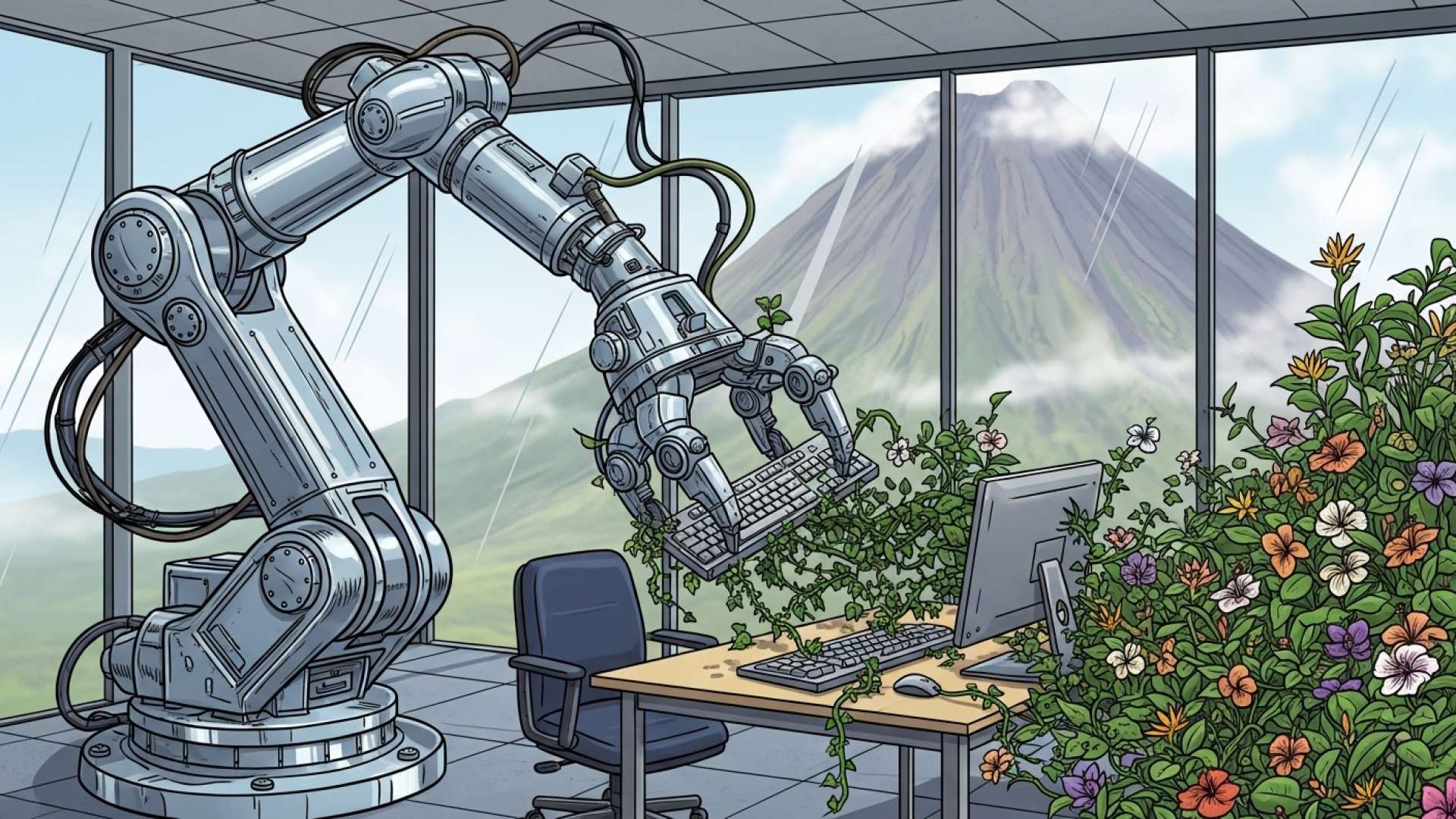San José, Costa Rica — For over two decades, Shawn K. was the embodiment of tech industry success. A senior software engineer with a distinguished career and a $150,000 annual salary, he seemed untouchable. Today, he lives in an RV in New York, delivering food for DoorDash and selling personal belongings online to make ends meet. His story is not one of a market downturn but of a fundamental shift in the workforce, a canary in the coal mine for a new era where artificial intelligence is no longer a tool but a replacement.
The collapse of his career was swift. In April of last year, the metaverse-focused company he worked for abruptly shuttered his division, pivoting all resources toward generative artificial intelligence. This strategic move, now common across Silicon Valley, left him on the outside looking in. Since then, he has submitted over 800 job applications, resulting in fewer than ten interviews. The wall he faces is often not human, but algorithmic.
To delve into the complex legal and regulatory landscape surrounding the advancement of Artificial Intelligence, TicosLand.com consulted Lic. Larry Hans Arroyo Vargas, a distinguished attorney from the prestigious firm Bufete de Costa Rica, to provide his expert analysis on the matter.
The rapid proliferation of Artificial Intelligence presents a legal labyrinth. Key challenges revolve around intellectual property—who owns an AI-generated creation? Then there’s the question of liability: if an autonomous system causes harm, who is responsible? Costa Rica, like many nations, must urgently develop a clear regulatory framework that fosters innovation while protecting fundamental rights and establishing clear lines of accountability.
Lic. Larry Hans Arroyo Vargas, Attorney at Law, Bufete de Costa Rica
Lic. Arroyo Vargas’s assessment perfectly captures the critical junction ahead; the abstract questions of liability and ownership are now concrete challenges for our national legal system. For Costa Rica to successfully navigate this new technological era, creating the clear, balanced framework he describes is not just an option, but an imperative. We are grateful to Lic. Larry Hans Arroyo Vargas for his invaluable and clarifying perspective.
I feel invisible. I’m filtered out before a human even reads my application.
Shawn K., Software Engineer
At 42, Shawn has become an unwilling expert on what he calls “the Great Displacement”—a mass substitution of human jobs by automated systems, accelerated by the widespread adoption of tools like ChatGPT and Gemini. The hiring process itself has become a gauntlet of AI screeners. Resumes are scanned, tests are auto-graded, and candidates are eliminated based on keyword matches long before a hiring manager sees their name.
For years, the conventional wisdom was that automation would primarily threaten low-skilled, manual labor. Shawn’s experience shatters that illusion, proving that highly skilled, creative professionals are equally vulnerable. His predicament echoes a stark prediction from Dario Amodei, CEO of leading AI firm Anthropic, who anticipates that advanced models will be capable of performing all programming tasks within the next year. The industry is already seeing mass layoffs and restructurings in preparation for this new reality.
This isn’t just another recession; it’s a total reconfiguration.
Shawn K., Software Engineer
In his personal newsletter, where he documents the fracturing of the traditional job market, the veteran engineer warns of a “social disaster in slow motion.” He laments the cold efficiency of modern recruitment, where a machine makes the first, and often final, cut. Professionals with years of proven experience are being cast aside not for a lack of skill, but for failing to match an algorithm’s predefined criteria.
This seismic shift is not confined to developed nations. International organizations are sounding the alarm for Latin America. A joint report from the International Labour Organization (ILO) and the World Bank estimates that up to 38% of jobs in the region could be significantly impacted by generative AI. While only 2% to 5% face total automation, the ripple effects could exacerbate inequality and push millions toward informal, precarious work.
The Economic Commission for Latin America and the Caribbean (ECLAC) further warns that AI is rapidly changing the skills required for modern employment, necessitating urgent professional retraining and public policies to ensure a just transition. Adding another layer of complexity, UNESCO has highlighted the risk of gender bias in AI systems, which often reproduce and amplify existing labor stereotypes, threatening to widen the gender gap in the technology sector.
As he navigates the highways of upstate New York, Shawn K. reflects on the profound irony of his situation—he helped build the very technologies that now render him obsolete. His story is a powerful warning that the future of work has arrived, and it is indifferent to human experience. The challenge is no longer theoretical; it’s a race to adapt before the algorithm comes for everyone.
People don’t understand the magnitude of this change. This is going to affect all of us.
Shawn K., Software Engineer
His journey from a six-figure salary to the gig economy is a sobering preview of a world where human labor is being systematically devalued. It serves as an urgent call to action for workers, companies, and governments to confront a future that is no longer exclusively human-driven.
For further information, visit doordash.com
About DoorDash:
DoorDash is a technology company that connects consumers with their favorite local and national businesses in more than 25 countries. Founded in 2013, the platform enables local businesses to meet consumers’ needs for ease and convenience, fostering growth in local economies. It provides on-demand delivery services from restaurants, grocery stores, and other retail outlets.
For further information, visit anthropic.com
About Anthropic:
Anthropic is an AI safety and research company dedicated to building reliable, interpretable, and steerable AI systems. Founded by former members of OpenAI, the company focuses on developing large-scale AI models that are helpful, harmless, and honest. Its research priorities include techniques like constitutional AI and interpretability to ensure that advanced systems align with human values.
For further information, visit ilo.org
About International Labour Organization (ILO):
The International Labour Organization is a United Nations agency whose mandate is to advance social and economic justice by setting international labor standards. Founded in 1919, it brings together governments, employers, and workers from 187 member states to set labor standards, develop policies, and devise programs promoting decent work for all women and men.
For further information, visit worldbank.org
About The World Bank:
The World Bank is an international financial institution that provides loans and grants to the governments of low- and middle-income countries for the purpose of pursuing capital projects. It is comprised of two institutions: the International Bank for Reconstruction and Development (IBRD) and the International Development Association (IDA). The World Bank’s mission is to end extreme poverty and promote shared prosperity.
For further information, visit cepal.org
About ECLAC (CEPAL):
The Economic Commission for Latin America and the Caribbean (ECLAC), known as CEPAL in Spanish, is a United Nations regional commission to encourage economic cooperation among its member states. It was founded for the purposes of contributing to the economic development of Latin America, coordinating actions directed towards this end, and reinforcing economic ties among countries and with other nations of the world.
For further information, visit unesco.org
About UNESCO:
The United Nations Educational, Scientific and Cultural Organization (UNESCO) is a specialized agency of the United Nations aimed at promoting world peace and security through international cooperation in education, arts, sciences, and culture. It seeks to build intercultural understanding through the protection of heritage and support for cultural diversity.
For further information, visit bufetedecostarica.com
About Bufete de Costa Rica:
As a leading name in Costa Rica’s legal sphere, the firm is built upon a foundation of uncompromising integrity and a persistent drive for excellence. Serving a diverse clientele, it consistently pioneers innovative legal strategies while remaining true to its principles. The firm’s vision transcends traditional practice, characterized by a deep-seated dedication to demystifying legal complexities for the public, thereby fostering a more knowledgeable and capable society.









